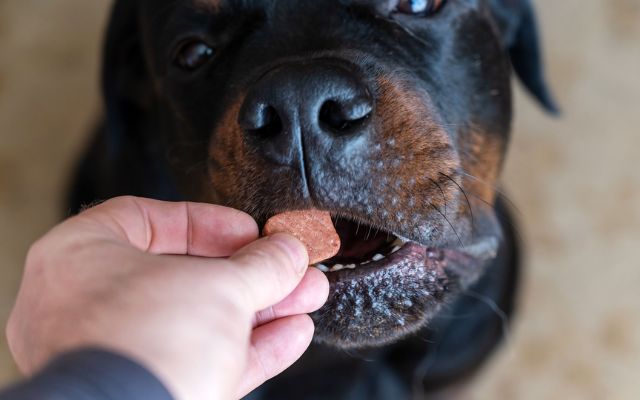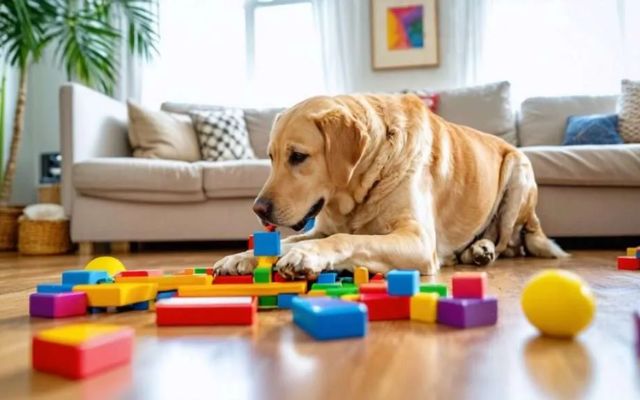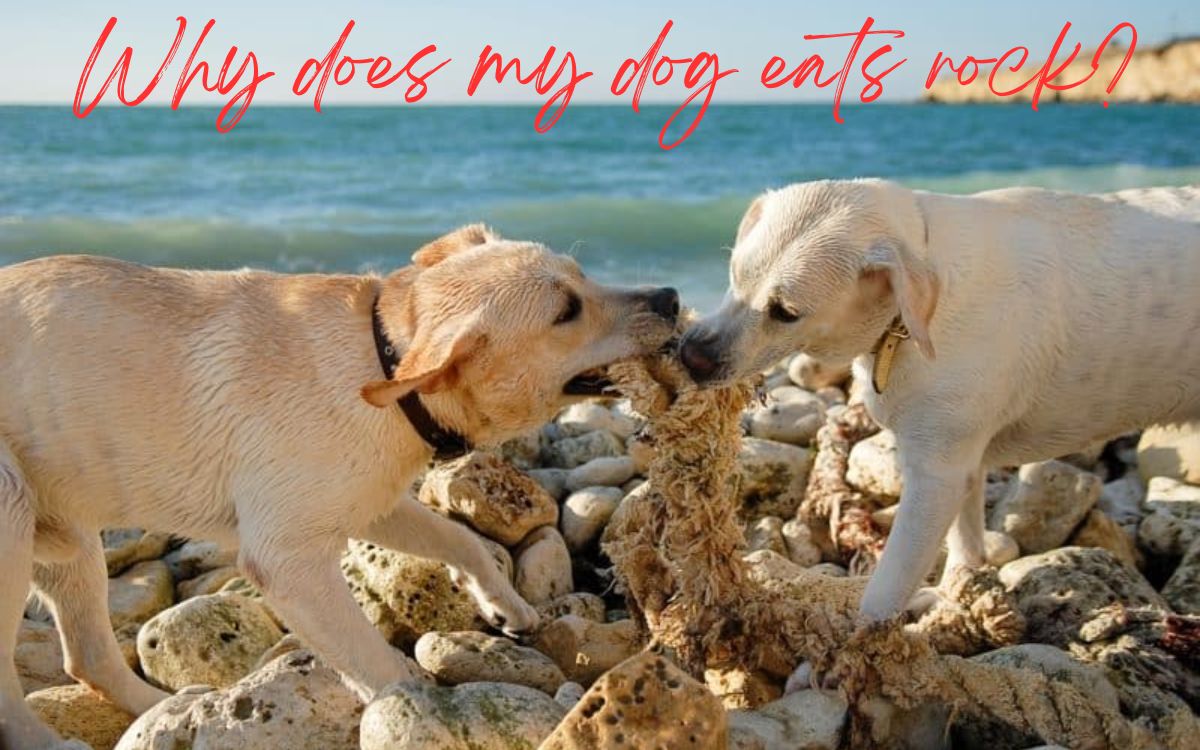Have you ever caught your beloved canine companion munching on a pebble as if it were a gourmet treat? If so, you’re not alone. Many dog owners have witnessed this perplexing behavior and wondered, “Why does my dog eat rocks?” While seemingly unusual, rock-eating, known medically as pica, is more common in dogs than one might think.
This comprehensive guide aims to shed light on the many reasons behind this behavior, ranging from medical concerns to behavioral triggers and even psychological factors. Understanding the root cause is crucial for addressing the issue and ensuring your furry friend’s well-being. Throughout this article, we will explore various possible explanations for why dogs eat rocks, offer practical prevention and management strategies, and even delve into some unique insights that you might not find elsewhere.

By the end, you’ll not only have a deeper understanding of this peculiar habit but also be equipped with the knowledge to help your dog overcome it. So, let’s dive into the fascinating world of canine behavior and uncover the mysteries behind why our four-legged friends sometimes crave the crunch of rocks.
Medical Reasons: When Rocks Aren’t Just a Snack
You might have chuckled the first time you saw your dog nibbling on a pebble, but rock-eating, or pica, can be more than just a quirky canine habit. It can actually be a red flag for underlying health issues. Let’s take a closer look at the medical reasons behind this unusual behavior:
Nutritional Deficiencies: A Hidden Hunger
One of the most common culprits behind rock-eating is a nutritional deficiency. When a dog’s diet lacks essential vitamins or minerals, their body might crave them in unexpected places – like your garden rocks. This is especially prevalent in dogs with poor-quality diets or those struggling with conditions that hinder nutrient absorption.
- Iron Deficiency: Iron is vital for healthy blood. If your dog is iron deficient, they might develop anemia and crave iron-rich substances, like dirt or, unfortunately, rocks.
- Calcium Deficiency: Strong bones and teeth depend on calcium. A lack of this mineral might send your dog on a quest for calcium-containing objects, even if those objects are inedible.
- Other Mineral Deficiencies: Zinc, potassium, and magnesium deficiencies can also trigger pica in dogs.
Underlying Medical Conditions: More Than Meets the Eye
Rock-eating can also signal a range of underlying medical issues:
- Gastrointestinal Problems: Conditions like inflammatory bowel disease (IBD) can cause discomfort and disrupt nutrient absorption, leading dogs to seek out rocks or other non-food items for relief.
- Endocrine Disorders: Diabetes and thyroid problems can throw a dog’s appetite and cravings out of whack, potentially leading them to munch on rocks.
- Pain or Discomfort: Sometimes, rock-eating is a way for dogs to self-soothe dental pain or tummy aches. If your dog suddenly develops a taste for rocks, it’s crucial to rule out any underlying pain.
- Medications: Certain medications can increase a dog’s appetite or alter their taste buds, making rocks seem surprisingly appetizing.
Pica: Not Just a Rock Problem
It’s important to remember that pica isn’t just about rocks. Dogs with pica might crave and consume all sorts of non-food items, like dirt, fabric, plastic, or even poop. Rocks are just one piece of this complex puzzle.
Your Vet: The Pica Detective
If your dog is chowing down on rocks, don’t hesitate to visit your veterinarian. A thorough exam and some diagnostic tests can help uncover any underlying medical issues. Your vet can then tailor a treatment plan, whether it involves dietary changes, supplements, or medications, to get to the root of the problem.
Behavioral Triggers: Why Your Dog Might Be a “Rock Star”
Believe it or not, your dog’s rock-eating habit might be more about boredom and anxiety than an actual craving for granite. Let’s decode some of the behavioral triggers that could be turning your pup into a pebble connoisseur:
Boredom Busters: A Tired Dog is a Happy (and Less Rock-Hungry) Dog
Imagine if you were stuck at home all day with nothing to do. You might resort to some pretty strange activities too, right? Dogs are no different. A lack of mental and physical stimulation can lead to boredom, and bored dogs often turn to destructive behaviors like rock-eating.
- Mental workouts: Challenge your pup’s brain with puzzle toys, interactive games, and training sessions.
- Physical workouts: Regular walks, runs, or playtime can help tire out your dog and curb their rocky cravings.
Anxiety Antidotes: Help Your Dog De-Stress
Just like us, dogs can get stressed out. Changes in routine, separation anxiety, or environmental stressors can all trigger pica.
- Separation Anxiety Soothers: If your dog gets anxious when left alone, consider providing them with a safe chew toy or working with a certified animal behaviorist to address their anxiety.
- Stress-Busting Strategies: Identify and eliminate any potential stressors in your dog’s environment, such as loud noises or unfamiliar situations.

Breaking Bad Habits: Turning “Bad” Attention into Good Attention
Sometimes, dogs learn that even negative attention, like a scolding for eating rocks, is still attention. This can inadvertently reinforce the behavior.
- Positive Reinforcement: Reward your dog for chewing on appropriate toys or engaging in desired behaviors. This will encourage them to ditch the rocks for something more rewarding.
- The Power of Ignoring (When Safe): If your dog is in a safe environment, try ignoring their rock-eating behavior. This can help break the cycle of negative attention.
Breed Quirks: Some Breeds Just Love to Chew
While any dog can develop pica, certain breeds are more prone to it due to genetics or strong chewing instincts. If your dog is a notorious chewer, like a Labrador Retriever or German Shepherd, they might be more likely to explore the world with their mouths, including sampling the occasional rock.
Psychological Factors: The Mind Behind the Munching
Sometimes, your dog’s rock-eating habit might be more than a quirky behavior – it could stem from deeper emotional or psychological issues. Let’s explore these less obvious, but important, triggers:
Compulsive Cravings: When Rock-Eating Becomes an Obsession
For some dogs, rock-eating can turn into a compulsion, similar to how some people experience obsessive-compulsive disorder (OCD). These dogs feel an irresistible urge to eat rocks, even if it means ignoring consequences or rewards.
- Spotting the Signs: If your dog’s rock-eating is frequent, intense, and hard to interrupt, it might be a compulsion.
- Getting Help: A certified animal behaviorist can diagnose and treat compulsive disorders, using techniques like behavior modification or medication to help your dog regain control.
Past Pain, Present Problems: The Lingering Effects of Trauma
Early trauma, like neglect or abuse, can leave lasting emotional scars on dogs. In some cases, these scars can manifest as unusual behaviors like pica. For traumatized dogs, rock-eating might offer comfort or a sense of control in an otherwise uncertain world.
- History Matters: If your dog has a history of trauma, share it with your vet or behaviorist. This information is crucial for developing an effective treatment plan.
- Creating a Safe Haven: Providing a safe and loving environment can help your dog heal and reduce their anxiety, minimizing the urge to engage in compulsive behaviors like rock-eating.
Genetic Whispers: When Nature Plays a Role
While not fully understood, genetics might play a role in some dogs’ tendency to develop pica. Certain breeds may be predisposed to this behavior due to their inherited traits.
- Know Your Breed: If your dog belongs to a breed known for pica, be extra vigilant and proactive in preventing and managing rock-eating.
Understanding these psychological factors can help you and your vet or behaviorist address the root cause of your dog’s rock-eating, leading to a happier, healthier pup.
Prevention and Management: From Rock-Muncher to Model Citizen
Ready to transform your rock-loving pup into a model citizen? Here’s your action plan for preventing and managing rock-eating:
Beat Boredom, Banish Rocks
A bored dog is a dog with time to find trouble, like tasty-looking rocks. Keep your pup engaged and entertained to curb their cravings:
- Mind Games: Puzzle toys, interactive feeders, and training games are like brain candy for dogs, keeping them mentally stimulated and less likely to snack on stones.
- Get Moving: Daily exercise, whether it’s walks, runs, fetch, or dog park romps, will tire your pup out and reduce their desire to munch on rocks.
- Chew This, Not That: Offer a variety of safe and appealing chew toys – think durable rubber or nylon options – to satisfy your dog’s natural urge to chew.
Chill Out, Pup!
If anxiety is your dog’s rock-eating trigger, help them find their zen:
- Pheromone Power: Pheromone diffusers mimic calming dog scents, helping to reduce anxiety and stress.
- Supplements for Serenity: Natural supplements like chamomile or L-theanine can promote relaxation, but always check with your vet first.
- Behavior Makeover: If separation anxiety is the culprit, a certified animal behaviorist can help you and your pup master techniques to manage it.

Rewards, Not Reprimands
Positive reinforcement is key to changing behavior. Instead of scolding your dog for eating rocks, focus on rewarding them for making good choices.
- Catch Them Being Good: Shower your dog with praise, treats, or playtime when they chew on their toys instead of rocks.
- Ignore (When Safe): If you spot your dog nibbling on a rock in a safe setting, calmly redirect their attention to a chew toy.
Rock-Proof Your World
Make your home and yard a rock-free zone to minimize temptation:
- Supervise Outdoor Adventures: Keep a close eye on your dog during walks or playtime in areas with rocks, and redirect their attention if they get too close.
- Clear the Clutter: Remove loose rocks and gravel from your yard and living spaces.
- Barrier to Entry: If you can’t completely remove rocks, consider fencing off areas to limit your dog’s access.
Expert Advice: Your Pica Support Team
If your dog’s rock-eating habit persists or worsens, don’t hesitate to seek help from your veterinarian or a certified animal behaviorist. They can develop a personalized plan to address your dog’s specific needs and get them on the path to a healthier, happier life.
Beyond the Basics: Creative Solutions for Rock Eaters
If your dog’s rock obsession hasn’t budged with the usual advice, don’t worry! There are some out-of-the-box solutions that might just do the trick:
Make Rocks Repulsive: The Taste Test Trick
Ever heard of bitter apple spray? It’s a taste deterrent that can make rocks unappealing to your pup. A little spritz can transform those tempting pebbles into bitter bites, encouraging your dog to seek out tastier (and safer) treats.
Swap Stones for Satisfaction: The Art of the Chew Toy
If your dog’s main motivation is the joy of chewing, give them safer, more satisfying options:
- Edible Delights: Dog-safe chew toys come in a variety of flavors and textures, providing hours of entertainment and a safe outlet for their chewing instincts.
- Bone Appetit (with Caution): Supervised raw or cooked bones can be a tasty chew, but choose the right size to avoid choking or splintering hazards.
- Frozen Fun: Frozen carrots, Kongs filled with peanut butter, or even ice cubes can provide a refreshing and stimulating chewing experience.
Gut Check: The Link Between Digestion and Pica
Emerging research suggests that a healthy gut might help reduce pica cravings. While the science is still evolving, these options might be worth exploring with your vet’s guidance:
- Probiotics: These “good” bacteria can help balance the gut, potentially reducing the urge to eat non-food items.
- Digestive Enzymes: These enzymes aid digestion and nutrient absorption, which could address any underlying deficiencies that might be triggering pica.
Remember, these are just extra tools to add to your arsenal, alongside your vet’s advice. If you’re trying any of these uncommon solutions, chat with your vet first to make sure they’re a good fit for your furry friend.
Conclusion: A Happier, Healthier, Rock-Free Pup
Your dog’s rock-eating habit doesn’t have to be a mystery. By understanding the many reasons behind it – from medical needs to boredom busters – you can create a rock-solid plan for a healthier, happier pup.
Start with a vet visit to rule out any medical causes and get personalized advice. Then, take action:
- Feed Them Right: Make sure your dog’s diet is balanced and nutritious.
- Beat Boredom: Fill their days with games, exercise, and stimulating toys.
- Chill Zone: Help your stressed pup find zen with calming aids and activities.
- Catch Them Being Good: Reward positive behaviors to reinforce good habits.
- Rock-Proof Your World: Make your home and yard a rock-free oasis.
Remember, patience and consistency are key. It may take time to see results, but with your dedication, your dog can overcome their rock-eating habit and thrive. If you need extra support, don’t hesitate to seek help from your veterinarian or a certified animal behaviorist. They’re your partners in helping your furry friend live their best, rock-free life!
FAQs
My dog loves chewing on rocks! Should I be worried?
While occasional rock nibbling might seem harmless, frequent rock-eating can signal underlying issues, from boredom to medical conditions. A quick vet check can rule out any serious concerns and help you address the behavior.
Why do some dogs seem more drawn to rocks than others?
Certain breeds, especially those known for their chewing instincts or working roles, might be more likely to munch on rocks. Additionally, dogs with nutritional deficiencies or underlying medical conditions might seek out rocks for missing minerals.
How do I know if my dog’s rock-eating is a medical issue or just a bad habit?
While puppies often explore with their mouths, persistent rock-eating in adult dogs could signal pica, a condition involving cravings for non-food items. If your dog’s rock-eating is frequent, obsessive, or accompanied by other symptoms like vomiting, consult your vet for a proper diagnosis.
Can eating rocks seriously harm my dog in the long run?
Absolutely. Chronic rock-eating can lead to a host of health problems, including dental damage, intestinal blockages, and nutritional deficiencies. It’s crucial to address the behavior early on to prevent these complications.
Could my dog’s diet be the reason they’re eating rocks?
It’s possible. A poor-quality diet or specific nutrient deficiencies can trigger cravings for non-food items like rocks. A vet-approved, balanced diet tailored to your dog’s needs might be the solution to their rocky cravings.

Healthy dogs mean happy dogs, and that makes me happy! I’m here to share all the tips for keeping your best furry friend in top shape, from puppyhood to their golden years.

